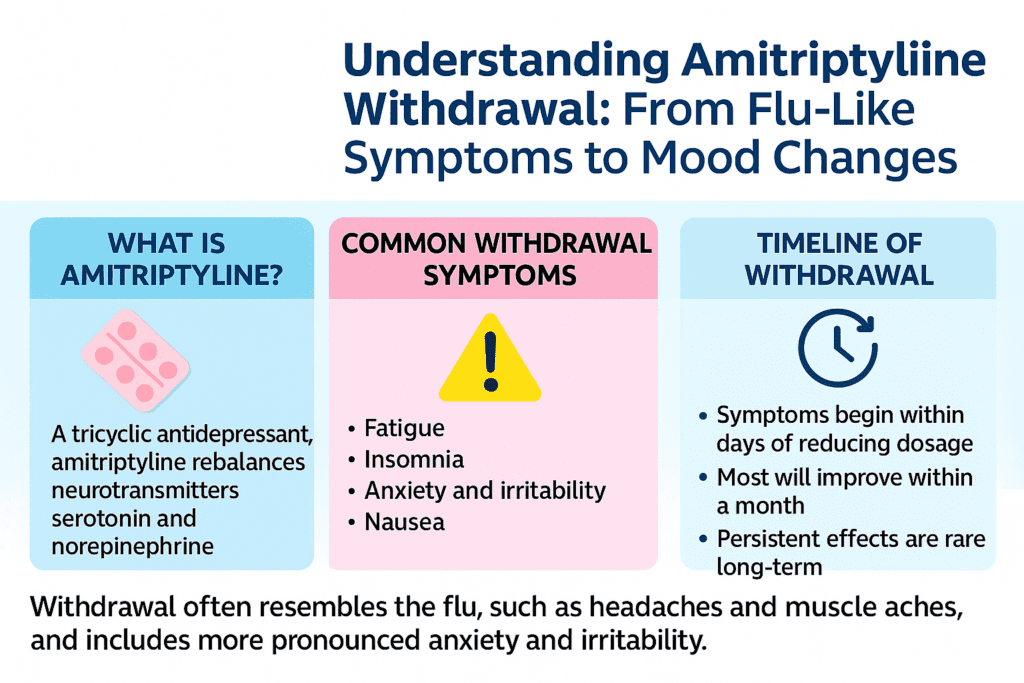Thinking of stopping Amitriptyline? Discover what withdrawal really feels like, how to manage symptoms, and why professional support makes all the difference.

If you’ve been taking Amitriptyline for months or years and are considering stopping, you’re probably wondering what to expect. Amitriptyline withdrawal can catch people off guard because many assume that antidepressants don’t cause withdrawal symptoms like other medications.
The reality is quite different. Stopping this medication abruptly can trigger a range of uncomfortable symptoms that feel surprisingly similar to having the flu, combined with emotional changes that can be distressing.
Understanding what happens during withdrawal helps you prepare and make informed decisions about your medication. Whether you’re stopping because of side effects, feeling better, or wanting to try a different treatment approach, knowing what lies ahead makes the process more manageable.
What Is Amitriptyline and Why Is It Prescribed?
Amitriptyline belongs to a class of medications called tricyclic antidepressant withdrawal medications, which were among the first antidepressants developed. While newer antidepressants have largely replaced tricyclics for treating depression, doctors still prescribe Amitriptyline for various conditions because of its effectiveness.
Beyond depression, physicians commonly prescribe Amitriptyline for chronic pain conditions, including fibromyalgia and nerve pain. The medication proves particularly useful for preventing migraines and treating certain sleep disorders. Some doctors prescribe it off-label for conditions like irritable bowel syndrome or eating disorders.
The medication works by affecting multiple neurotransmitter systems in the brain, including serotonin and norepinephrine. This broad action explains both its effectiveness for various conditions and the complexity of stopping it safely.
People decide to discontinue Amitriptyline for various reasons. Some experience bothersome side effects like weight gain, dry mouth, or drowsiness. Others feel their original condition has improved enough that they no longer need medication. Sometimes doctors recommend switching to a different medication that might work better or have fewer side effects.
Why Do Withdrawal Symptoms Occur?
Amitriptyline withdrawal symptoms occur because your brain has adapted to the presence of the medication over time. When you take Amitriptyline regularly, your brain adjusts its natural production and processing of neurotransmitters to account for the medication’s effects.
Physical dependence on Amitriptyline is different from addiction. Physical dependence is a normal biological response that happens when your body adapts to a medication. Your brain essentially recalibrates its baseline functioning to include the medication’s presence. When you remove the medication, your brain needs time to readjust to functioning without it.
This adjustment process is what causes withdrawal symptoms. Your brain is essentially relearning how to manage neurotransmitter levels without pharmaceutical assistance. The process takes time because brain chemistry changes don’t happen overnight.
Antidepressant discontinuation syndrome is the medical term for this phenomenon. It can occur with most antidepressants, not just tricyclics like Amitriptyline. The severity and duration of symptoms depend on factors like how long you’ve taken the medication, your dosage, your individual brain chemistry, and how quickly you stop.
Common Withdrawal Symptoms: What to Expect
The symptoms of Amitriptyline withdrawal often feel like having the flu combined with emotional turbulence. Physical symptoms frequently include fatigue that makes even simple tasks feel exhausting, muscle aches similar to what you might experience during an illness, headaches that can range from mild to severe, and nausea that may come and go throughout the day.
Sleep disturbances are particularly common during withdrawal. You might experience insomnia, making it difficult to fall asleep or stay asleep through the night. When you do sleep, you may have unusually vivid or disturbing dreams. Some people report feeling restless even when they’re tired.
Mood changes after stopping antidepressants can be especially challenging. Anxiety often increases, sometimes manifesting as general nervousness or specific worry about the withdrawal process itself. Irritability may make you feel short-tempered with family, friends, or coworkers. Some people experience mood swings that feel unpredictable and intense.
Other possible symptoms include dizziness, especially when standing up quickly, increased sweating, and changes in appetite. Some people report feeling emotionally numb or disconnected, while others describe heightened sensitivity to emotions and situations.
Timeline of Amitriptyline Withdrawal
Withdrawal symptoms don’t appear instantly. Most people start to feel effects within 2 to 5 days after reducing or stopping their medication. The withdrawal timeline depends on how long you’ve been taking the medication, your dosage, and your overall health.
Typical phases look like this:
- First week: Onset of symptoms, especially physical discomfort and sleep disruption
- Second to third week: Emotional symptoms become more noticeable
- After one month: Most symptoms improve, but some may persist in mild forms
Long-term symptoms are rare but may occur in individuals with co-occurring conditions or a history of mental health instability.
Safe Strategies for Tapering Off Amitriptyline
Safe medication tapering is crucial when discontinuing Amitriptyline. Medical supervision during this process can make the difference between a manageable experience and a difficult ordeal. Healthcare providers understand how to create tapering off Amitriptyline schedules that minimize withdrawal symptoms while ensuring your safety.
A typical tapering schedule might involve reducing your dose by 10-25% every one to two weeks, depending on your starting dose and how you respond to each reduction. For example, if you’re taking 50mg daily, your doctor might reduce you to 37.5mg for two weeks, then to 25mg for another two weeks, and so on.
Working with your healthcare provider allows for personalized adjustments to your tapering plan. If you experience significant symptoms at a particular dose reduction, your doctor can slow the process or temporarily maintain a dose until you stabilize.
Stopping Amitriptyline “cold turkey” can be risky and unnecessarily uncomfortable. Abrupt discontinuation often leads to more severe withdrawal symptoms and may increase the risk of your original condition returning suddenly. The gradual approach gives your brain time to adjust to each change.
Managing Withdrawal: Tips for Comfort and Safety
Managing Amitriptyline withdrawal symptoms involves both physical and emotional self-care strategies. Staying well-hydrated helps your body process the medication changes and can reduce some physical symptoms like headaches and fatigue. Eating regular, nutritious meals supports your body’s healing process and helps maintain stable blood sugar levels.
Sleep hygiene becomes especially important during withdrawal. Try to maintain regular sleep and wake times, even if sleep is difficult. Creating a calming bedtime routine and limiting screen time before bed can help improve sleep quality. If vivid dreams are disturbing your sleep, discuss this with your healthcare provider.
Gentle exercise, when you feel up to it, can help with both physical and emotional symptoms. Walking, light stretching, or yoga can reduce muscle tension and improve mood naturally. However, don’t push yourself too hard if you’re experiencing significant fatigue.
Stress management techniques like deep breathing exercises, meditation, or journaling can help you cope with anxiety and mood changes. Some people find that talking to trusted friends or family members about what they’re experiencing provides emotional support during the withdrawal process.
Dual Diagnosis: Amitriptyline Withdrawal and Substance Use Disorders
For individuals with both mental health conditions and substance use disorders, Amitriptyline withdrawal presents unique challenges. The discomfort of withdrawal symptoms can increase the risk of relapse for people in recovery from alcohol or drug addiction.
Dual Diagnosis Treatment recognizes that mental health and substance use disorders often occur together and influence each other. When someone is withdrawing from Amitriptyline while also maintaining sobriety from alcohol or drugs, the emotional and physical discomfort can feel overwhelming.
The anxiety, depression, and physical discomfort of antidepressant withdrawal might trigger cravings for substances that previously provided relief from similar feelings. This is why professional withdrawal support becomes especially important for people with co-occurring disorders.
Integrated care that addresses both mental health and addiction recovery simultaneously provides the best chance for successfully managing Amitriptyline discontinuation while maintaining sobriety. Healthcare providers experienced in dual diagnosis treatment understand these complex interactions and can provide appropriate support.
How Skypoint Recovery in Richmond, VA Can Help
For men dealing with Amitriptyline withdrawal while also managing addiction recovery, Skypoint Recovery in Richmond, Virginia offers specialized support designed specifically for male clients. Understanding that men often face unique challenges in addressing both mental health and substance use issues, our programs provide comprehensive care that addresses both aspects of recovery.
Our facility accepts Medicaid insurance and helps men figure out their financial options for treatment. The staff understands that seeking help for medication concerns takes courage, and they’re committed to making support accessible and judgment-free.
If you need support for both mental health and addiction issues, reaching out for professional help is a sign of strength. You can fill out our online form or call 804-552-6985 to learn more about how Skypoint Recovery can support you through this challenging but manageable process.
Related Blogs
-
Parenting and Family Healing After a Parent’s Addiction
-
Understanding Codependency and Caregiver Burnout in Addiction Recovery
-
Rebuilding Trust After Substance Use: A Step-by-Step Guide for Couples
-
Setting Healthy Boundaries with a Loved One Struggling with Substance Use
-
The Impact of Addiction on Relationships and How to Heal Them


Start Your Personalized Recovery Journey Now









